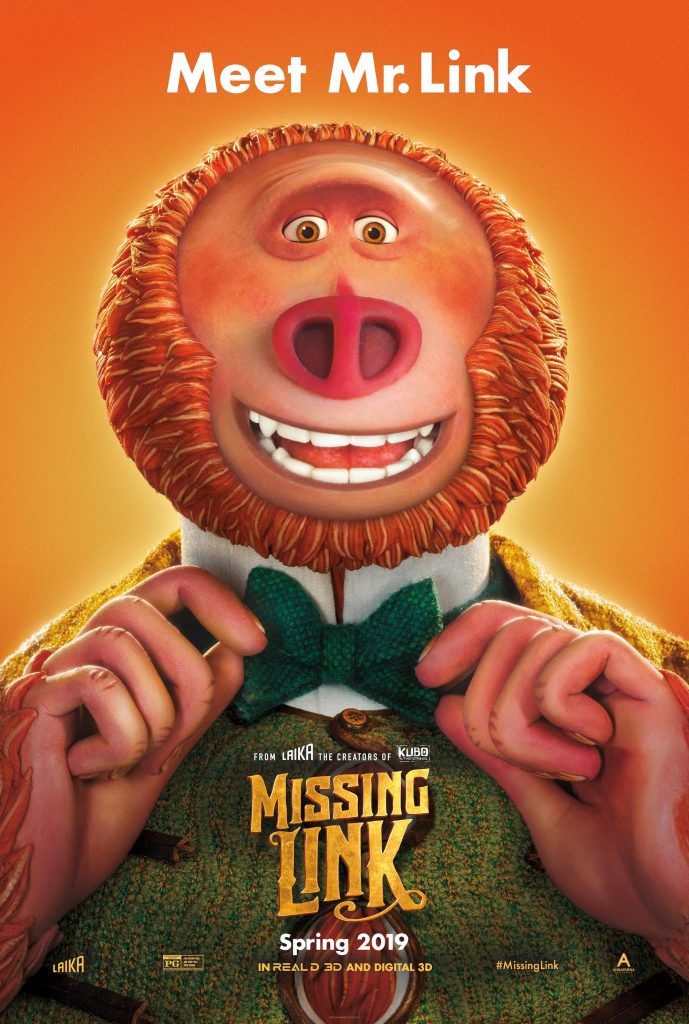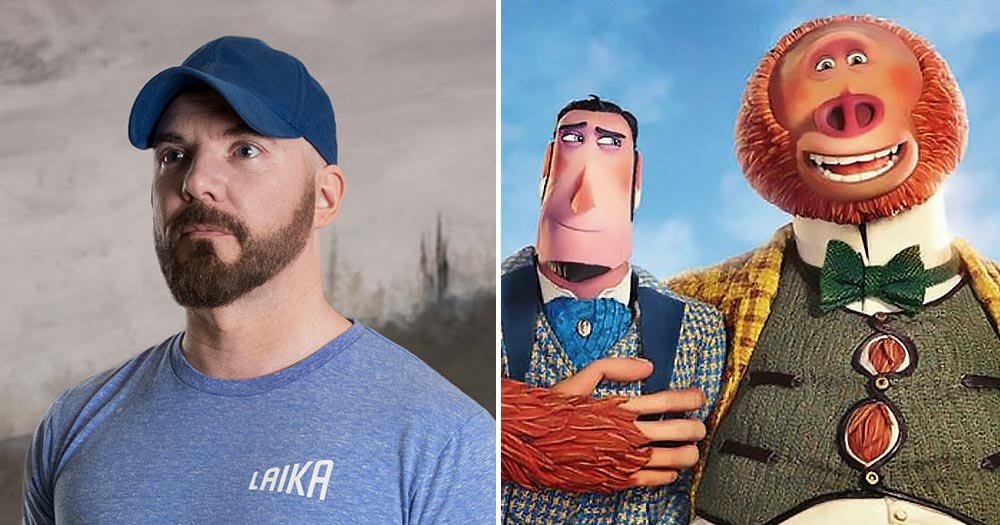I have been a huge fan of Laika Studios and their movies for a long time now. Having personally known Chris Butler, who worked on some of my favourite movies including ParaNorman and Kubo and the Two Strings, I was thrilled when offered the opportunity to interview him about his new Oscar-nominated movie, Missing Link.
The film tells the story of Link (Zach Galifianakis), a lonely Sasquatch living in the woods of Washington State who recruits disgraced explorer Sir Lionel Frost (Hugh Jackman) to help him find his long-lost relatives in the mystical valley of Shangri-La. Joined by adventurer Adelina Fortnight (Zoe Saldana), they will embark on an adventure across the globe which will change their lives forever.
Ahead of the Oscars ceremony, where Missing Link is nominated as Best Animated Feature, we chatted with the film’s writer and director, Chris Butler.
Hi Chris first of all, congratulations on your Golden Globes win and the Oscar nomination. This must be a really exciting time for you. What was it like to win the Golden Globe for Best Animated Movie?
I was just happy to get the nomination. I didn’t get a Globe nomination for ParaNorman so this was a first for me… I just went into the ceremony thinking “Not a chance.” Even when we took our tables, I was trying to figure out how to get to the stage and I thought “Nah, don’t bother. It’s not gonna happen.” So, when they read out the name, I actually can’t remember most of it because I was in a state of shock… Because we were up against such big movies, I just didn’t think we stood a chance. It took me several days to get over it.
Can you tell us about how the idea for Missing Link came about and what’s the story behind it?
I have several notebooks that date back 20 years or so. They are full of ideas. I’ve maybe got about a dozen ideas over the years that I keep going back to… Missing Link was one of these ideas. I wanted to do something that was kind of like Indiana Jones meets Sherlock Holmes. I wanted to write a big action movie. The studio had just done Kubo, which was quite dark. A beautiful kind of meditation on loss and grief. I wanted to do something completely different and so did Travis (Travis Knight, director of Kubo.) I think I also wanted to do a buddy movie where kind of the central theme was about identity. And I think that’s how the whole thing started to shape the story.
What do you think it is about stop motion animation that makes it stand out?
I think it’s less to do with the style of animation and more to do with the fact that stop motion is ultimately real life on real objects. You actually have a physical object on a set. It’s unique because it’s got one foot in live-action and one foot in animation. It almost speaks to your childhood, when you’re playing with toys and you’re imagining things come to life. There’s an element of that to it because you can tell that these things are real objects, and you almost want to reach in and touch them. It’s very hard to replicate. I think what we get is the imperfection of reality. And that comes from when you stitch a costume… You’ve got fuzz, and on the surface of the fabric you’ve got the weight and light refracts over different materials. There’s something magical about it.

I want to talk for a second about ParaNorman, which you also wrote and directed. I know that it was inspired by your childhood and you said that you see some of yourself in Norman. How much of your personal life do you take inspiration from when writing your scripts?
Everyone always says that when you write, you write about things that you know. Even though I’m writing about a talking bigfoot, ghosts, zombies and monsters, it’s still at the heart very much about the human experience. ParaNorman is this kid who didn’t fit in, who felt isolated. That was absolutely about me growing up as a gay kid. And in Missing Link, Sir Lionel and Link, they both have aspects of my character… My main guy who is living in the Pacific Northwest and he’s longing to find others like himself. And then you’ve got this British guy who is passionate about his vocation to the point where that’s pretty much all he’s gotten his life. And I do think that is a reflection of me. I always concentrate so hard on my career, on my passion which is animation, that other things have fallen by the side. I’m single, I don’t have an apartment, I want dogs but can’t have them.
I don’t think I’d be able to write about something and not imbue it with parts of my human experience. I think that’s what makes the most compelling stories, regardless of the subject matter… you don’t have to be a gay kid to empathize with that character. I think everyone knows what it’s like to not know where you belong in the world. I think everyone knows what it’s like to be bullied and everyone knows what it’s like to be alone. So, there are aspects of it that I think speak to so many people who watch it.
Speaking of ParaNorman, one of the characters is gay which is a huge deal for an animated movie. What I liked the most is that the character didn’t have a big “coming out” moment. His sexuality wasn’t a big deal which is very refreshing. Was it important to you to include an LGBT+ character and to portray him in a different light compared to the standard movie queer narrative?
It was absolutely important to me in ParaNorman to get that across because the narrative was about not judging a book by its cover… That was supposed to resonate through the whole movie: you see a character and you make a judgment. Even as an audience member you see a jock guy and you assume he’s straight. So that’s why Mitch is in there.
I think probably the proudest part of my career so far is being nominated for the GLAAD award because of that character. I think the inclusion of that character made me want all the more to be subversive, to challenge the status quo, to really push boundaries in children’s entertainment. I don’t just want to see narratives that are about being gay. I want to see narratives that are about everything for future gay characters. That is what representation is about. It’s like when people call me a gay filmmaker, I’m not a gay filmmaker. I’m a filmmaker. You don’t call someone a ‘straight filmmaker’.
As our first film to win the #GoldenGlobe and the studio’s fifth film to be nominated for the #AcademyAward for Best Animated Feature, we are proud of #MissingLink and the evolutionary step forward it represents in our distinctive approach to animation and original storytelling. pic.twitter.com/KDU5D3XRV7
— LAIKA (@LAIKAStudios) February 3, 2020
LGBT+ representation has come a long way in movies and tv shows. How do you think this representation could be taken even further?
Even though there has been a forward movement, culturally, there’s still this idea that children’s entertainment needs to be safe, needs to not challenge, needs to support the ideas of very middle American Christianity. I hate that it’s still difficult to get an openly gay character leading a mainstream movie. I hate that it’s a big deal that you have a gay character in a kid’s animated movie. And that’s part of what I wanted to do with Missing Link as well, to have a conversation about identity and how your identity is what you choose. It’s not what other people put upon you, which is why Link chooses the name Susan. I think a lot of younger audience members in particular, actually get it when they see that moment, they understand what it means. And particularly, what I’d like is that a lot of younger people see that moment, as a conversation between generations.
When I was younger I studied fairy tales and children’s literature and so much of the folkloric tradition of kids’ stories is about challenging them. I think films should be the same, I think TV should be the same. I actually think TV tends to be far more progressive than movies. I do think that with the advent of streaming, there is a probability that we can make a more forward movement because people are watching stuff that doesn’t have to conform to this tired ‘box office opening weekend’ bullshit. You can put more diverse content online for streaming because it will be watched, and that is great to me because I do think it opens the door to some more interesting and more challenging discussions.
What would it mean for you to win the Oscar for Best Animated Feature?
Just getting a nomination is an important thing for me. I think 38 movies were open consideration and I’m thinking to myself “to get in that final five, it’s amazing”. I think, ultimately, that award show means so much because you are voted for by your peers. So, just to get that acknowledgement, just to get recognition from people whose work you admire and aspire to, that means a lot. So it would be huge.
If you haven’t seen Missing Link in cinemas, make sure you get this little gem on DVD or Blu Ray.
© 2020 GCN (Gay Community News). All rights reserved.
Support GCN
GCN is a free, vital resource for Ireland’s LGBTQ+ community since 1988.
GCN is a trading name of National LGBT Federation CLG, a registered charity - Charity Number: 20034580.
GCN relies on the generous support of the community and allies to sustain the crucial work that we do. Producing GCN is costly, and, in an industry which has been hugely impacted by rising costs, we need your support to help sustain and grow this vital resource.
Supporting GCN for as little as €1.99 per month will help us continue our work as Ireland’s free, independent LGBTQ+ media.
